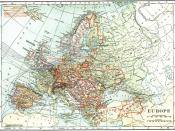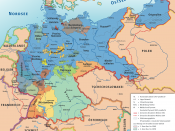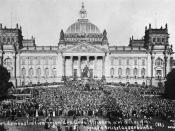The Weimar Republic was a democratic government that ran Germany when the Kaiser abdicated in November 1918. However running the country in the turbulent post war times was far from plain sailing as they had to deal with threats from left wing and right wing factions, the burden of the Versailles treaty and hyperinflation. Weimar survived these crises - but why was it able to?
Constantly after the break up of the war the Government had to stop attempts from political groups from seizing power. There were many attempts from left wing groups to get what they wanted - the workers striked, the Sparticists tried to being about a revolution, a left wing Bavarian republic was created, a Ruhr army was created and many soldiers and sailors protested and set up workers councils. Yet none of these ever came into fruitation, as they were badly organised and badly led. In fact the only that ever succeeded was the one that that took place in Bavaria.
However that later fell to a right wing group. The other attempts at revolution were quickly put out by the use of the Freikorps. This tactic did have its problems though as the Friekorps were the army who were more right wing. This meant that the left wing revolutionary's felt that they were being betrayed by Ebert and the majority Socialists. However most working class people weren't interested in revolting and having full scale political upheaval and left wing revolutionary parties did not receive a high percentage of the vote in elections. So whilst the left wing consistently threatened Weimar the threats were weak and they had not the support, nor the leadership to carry them through.
The threat from the right though was more serious. The right wing had allied themselves with the Government...


